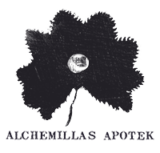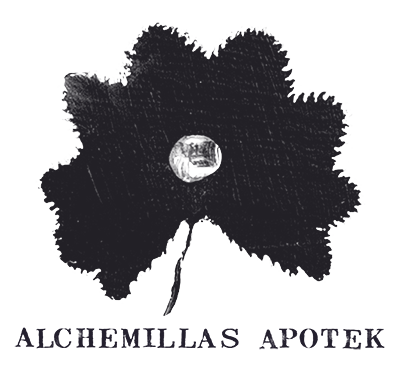Description
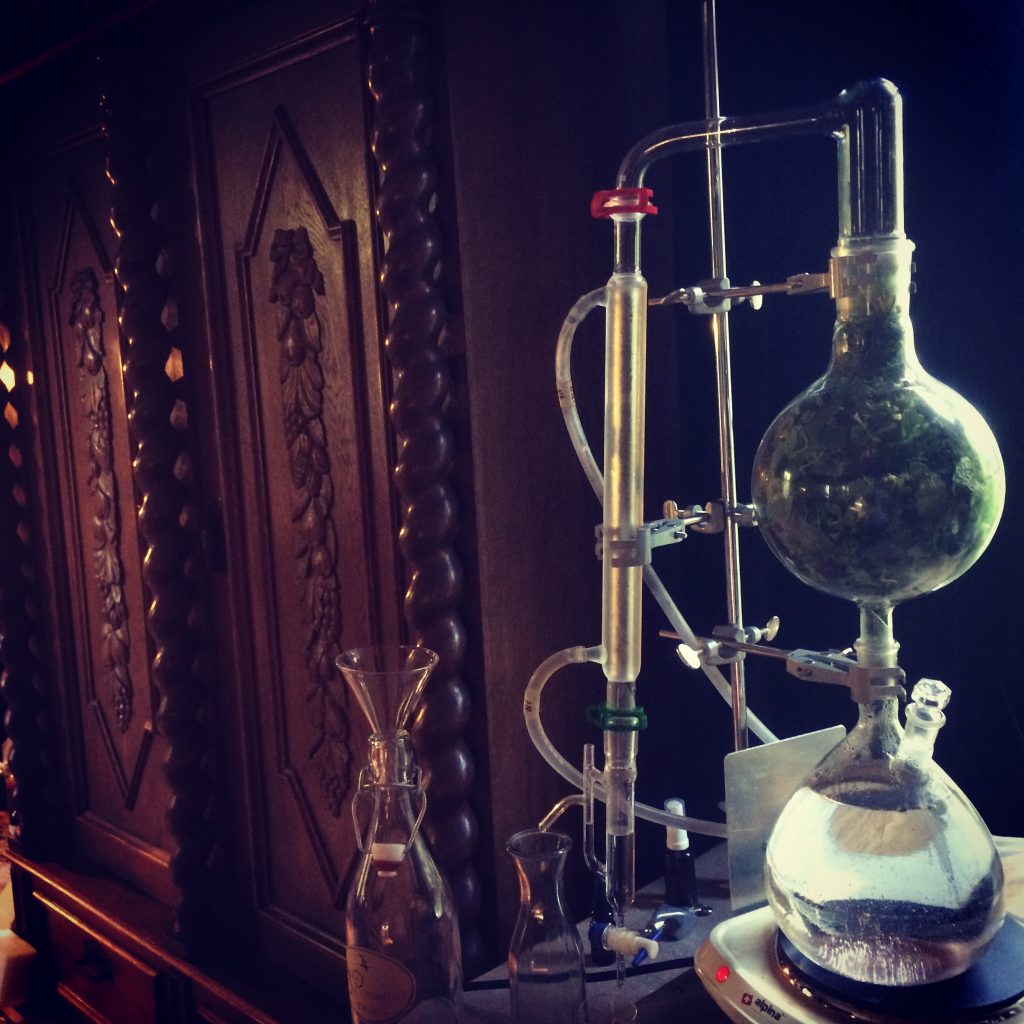
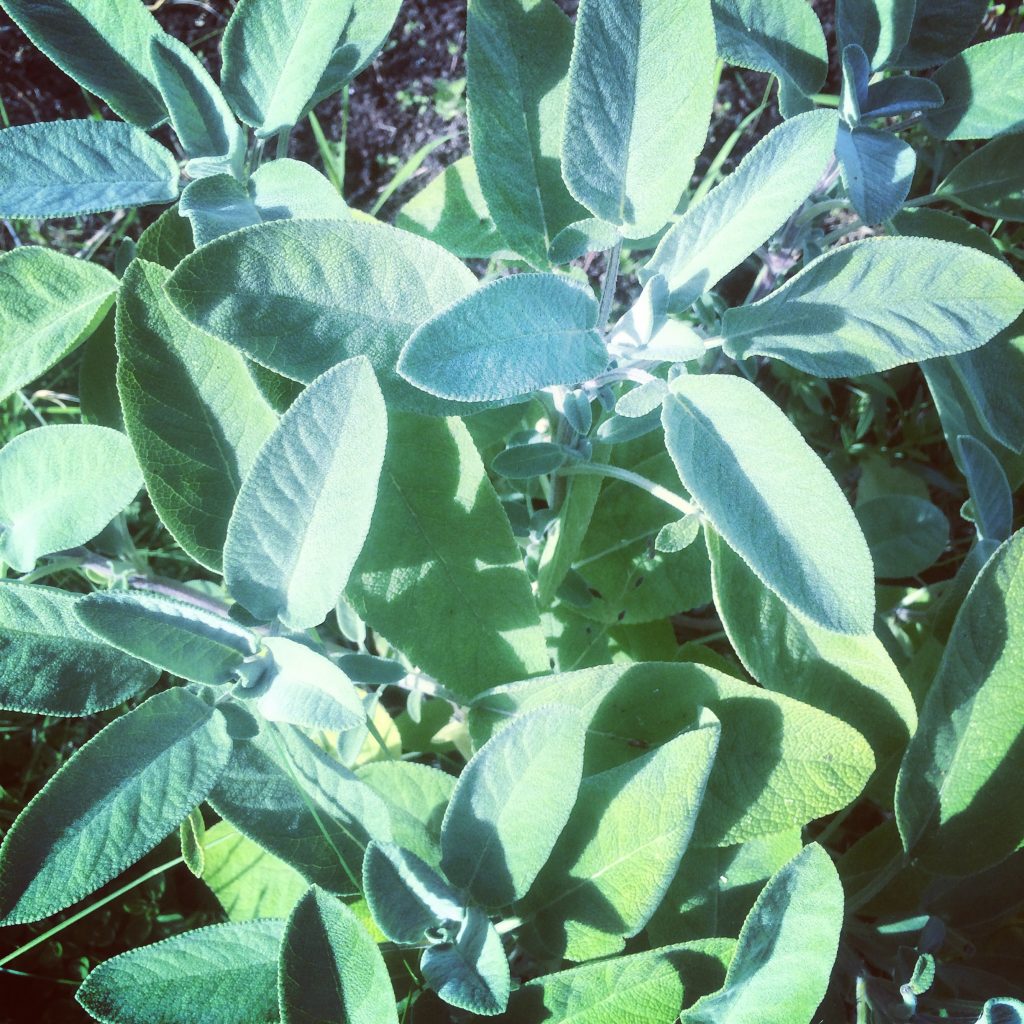
70 kr


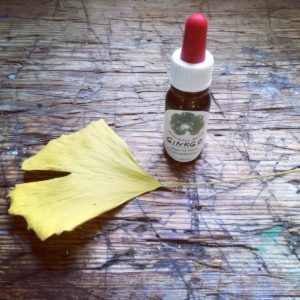
[:en]Ginkgo have lived for 300 million years on our earth.
![]()
The leaves of the Ginkgo tree contain different active substances at different stages, so I harvest thrice. Ginkgo improves circulation, it supports the heart and improves blood flow in tissues and organs, which protects cells against damage by oxidation by free radicals.
Ginkgo is thus an antioxidant and improves absorption of nutrients, providing vital oxygen supply to each cell. It aids vision and hearing-related problems due to these properties. It is also these characteristics that support memory. It is a brain-tonic.
![]()
Ginkgo is good against fatigue, gives energy and is good for depression by the particular phytochemicals it contains. Ginkgo is one of the nootropic plants that improve mental functions such as cognition, intelligence, motivation, memory and concentration.
![]()
Something interesting with the leaves of Ginkgo is that they look a bit like the two halves of the brain. Nature communicates with us via the doctrine of signatures, the signs of nature.
[:sv]Ginkgoträden har levt på vår jord i över 300 millioner år.
![]()
Jag skördar Ginkgons blad i 3 omgångar. Bladen innehåller olika verksamma ämnen i olika stadier. Ginkgo förbättrar cirkulationen vilket gör att den stödjer hjärtat och förbättrar blodflödet i vävnader och organ, vilket skyddar cellerna mot att skadas av oxidering av fria radikaler. Ginkgon är alltså en antioxidant och förbättrar upptaget av näringsämnen, ger livsviktig syretillförsel till varje cell. Den är mycket bra för syn och hörsel-relaterade besvär tack vare dessa egenskaper. Det är även dessa egenskaper som gör att den stödjer minnet och är bra för hjärnan.
![]()
Ginkgo är bra mot trötthet, ger energi och är bra mot depression genom sina speciella fytokemikalier. Ginkgo är en av de Nootropiska växterna som förbättrar mentala funktioner så som kognitiv förmåga, intelligens, motivation. minnesfunktion och koncentration.
![]()
Någonting intressant med Ginkgons blad är att de ser lite ut som två hjärnhalvor. Naturen kommunicerar med oss via signaturläran, signs of nature, naturens teckenspråk.[:]
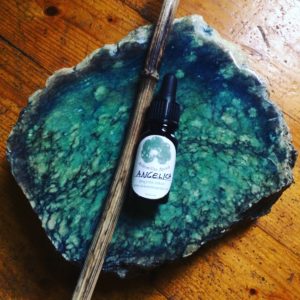
[:en]As above – So below
![]()
Angelica is bitter, warming and aromatic.
It can be useful in treatment of swellings, inflammations and glandular indurations, particularly of the head and neck region. Good for circulation, for cold hands and feet. Used for fever.
It is good for anguish, spasms, nervous excitation and fatigue; calms excess in both the sympathetic and parasympathetic branches of the autonomic nervous system. It is good for PMS and excessive bleeding while menstruating.
Can be used for for arthritis and gout. Good for the liver, increases digestion and metabolism of oil and production of bile, hence increases digestion and nutrition. It relaxes the throat and makes it easier to take long deep breaths. It simultaneously opens the imagination and the mind when prana (life force through breath) can flow.
![]()
Angelica is an important Shamanic plant among the Saami people of the North.
In Native American herbalism it is referred to as a “Bear Medicine”. Just as the bear goes into hibernation through the winter, bear medicine usually relax the mind, open the imagination and bring people into dreamtime. Angelica certainly has this capacity.
Bears eats these roots upon awakening in spring to wake up, clear their throat and start rebuilding their mass.
![]()
I see Angelica as an embodiment of the Alchemical device “As above so below”.
The deep aromatic root and the umbrella-like flower full of starlike seeds are connected through a hollow stem, a channel connecting the heaven and the earth. This is one of the effects the Spagyric Tincture may have upon you – making you feel like this channel.
Angelica connects you with your guardian angel, or if you prefer to call it your higher self.[:sv]Så som ovan – så och nedan
![]()
Kvanne är bitter, värmande och aromatisk.
Kan användas vid svullnader, inflammationer, särskilt i nack- och huvudregionen samt svullnade lymfkörtlar. Bra för cirkulationen, kalla händer och fötter.
Kan användas vid feber, ångesttillstånd, när man är nervöst uppjagad eller vid utmattning. Kvanne lugnar både det sympatiska och parasympatiska nervsystemet. Bra vid PMS och vid kraftig menstruationsblödning.
Kan användas vid artros och gikt. Bra för levern, matsmältningen och gallproduktionen.
Avslappnande för halsen och underlättar djupandning. När prana kan flöda (livskraft via andetaget) främjas fantasin och sinnet öppnas.
![]()
Kvanne är en viktig helande ört för shamanerna i norr, bla samerna. Hos de nordamerikanska indianerna hör kvanne till Björn-medicinerna.
På samma vis som björnen går i ide , har björn-medicinen en avslappnande verkan på sinnet, fantasin väcks och kontakten med drömtiden stärks.
Björnar äter kvannerötter när de vaknar på våren för att ta djupa andetag och för att stärka sig.
![]()
Jag upplever Kvanne som förkroppsligandet av den alkemiska devisen: Så som ovan- så och nedan. Den armotaiska roten och den paraply-formade
blomman full av stjärnlika frön förbinds av en ihålig stjälk, en kanal mellan himmel och jord. Angelica stärker förbindelsen med vår skyddsängel, eller
högre jag.[:]
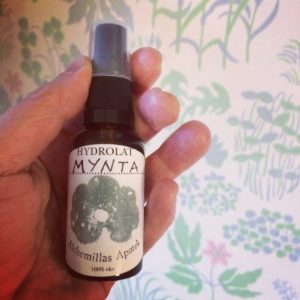
[:en]
Peppermint awakens the mind! Drink it in the morning to awaken the body, including the colon.
Spray on the face and body during external or internal (menopause) heatwaves.
Peppermint is phenomenal for concentration, when studying or writing. It cools the nerves but stimulates the mind. Spray a cloud and walk through it before important meetings or work with clients to be alert and present.[:sv]
Väcker sinnet! Drick på morgonen för att väcka hela kroppen till liv , även tarmen.
Spraya på ansiktet och kroppen vid värmevallningar eller för att kyla vid extern värmebölja.
Mynta är fenomenalt för koncentrationen, när man studerar eller skriver. Det kyler nerverna och stimulerar samtidigt hjärnan. Bra att ta gå in i ett litet myntamoln för att stiga ut cool och allert inför tex klientarbete eller andra viktiga möten.[:]
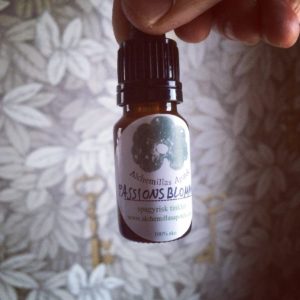
[:en]
“I remember him with a dark passionflower in his hand, looking at it as no one has ever looked at such a flower, though they might look from the twilight of day until the twilight of night, for a whole life long.” – Jorge Luis Borges
![]()
Passion flower is helpful in case of anxiety, insomnia and repetitive, compulsive thoughts.
![]()
The Spagyrisist and Alchemist talk of the Signature of a plant, Signs of Nature. Nature communicates with us through signs, colors, shapes etcetera.
Purple and white coloration often has to do with the nervous system and the crownchakra.
Another signature is the spiraling little tendrils . Passionflower is excellent to help the mind from going in loops. Very good for people that lie awake thinking in loops, unable to mellow down enough to relax and fall asleep.
![]()
This spiraling signature can also be connected to the planet Uranus who travels in a spiraling orbit . The sign Aquarius is ruled by this Planet that emanates a truly electrical energy.
An overly busy mind can lead to tension and anxiety if it spirals out of control.
Passionflower is your friend if you have these tendencies, to enable you to move down into intuition, into the body if you are too much up in the mind for your own good.
[:sv]
“I remember him with a dark passionflower in his hand, looking at it as no one has ever looked at such a flower, though they might look from the twilight of day until the twilight of night, for a whole life long.” – Jorge Luis Borges
![]()
Passionsblomma kan hjälpa vid ångest, sömnlöshet och tvångstankar eller tankar som upprepas och går i loopar.
![]()
Spagyrikern talar om Signaturläran. Signature = Signs of Nature. Naturens kommunicerar via färg, form och symboler. Lila och vita blommor indikerar ofta att de är särskillt lämpliga för kronchakrat. En annan signatur är de små spiralerna som passionsblomman skickar ut för att slingra sig vidare. De visar oss hur passionsblomman har en otrolig effekt på loopande tankar, tankar som liksom går i spiraler och som det kan vara svårt att stilla och därför försvåra sömn. Tankarna snurrar runt runt och det leder inte direkt någon vart heller, bara tillbaka till oron.
Tankar i stil med “Det kommer aldrig att gå, hur ska du orka, först ska jag göra det, sen ska jag göra det, sen ska jag göra det”. Eller att samma sak spelas upp gång på gång, som liksom inte ger en någon ro att varva ner för att finna lösningen, vilken har svårt att uppenbara sig i ett tjatter. Uppenbarelser eller svaret på gåtan kräver största möjliga tystnad i rymdens element.
![]()
Ett överaktivt sinne leder till spänningar och stress. Passionsblomman hjälper energin att gå i båda riktningar: nedåt i hjärtat och uppåt till intuitionen och det tredje ögat. Men även uppåt till kronchakrat i ett slags kosmiskt högre medvetande man kan vila i.
Det finns spännande teorier att läsa om passionsblomman som en symbol för Kristus. Jag ser även den mytologiske helaren och asteroiden Chiron som en en fantastisk arketyp för denna makalösa blomma. Här ser vi en till signatur, planeten Uranus som står för elektrisk mental energi i astrologin. Uranus är Merkurius högre oktav och är den enda planeten i vårt solsystem vars bana just snurrar i spiraler. Asteroiden Chiron, universums arketyp för helaren och shamanen färdas i en bana från det synligas sista utpost: Saturnus. Därefter färdas den ut, i den för oss osynliga sfären, där han rundar Uranus och återkommer med läkande visdom från den osynliga sfären.
I Alkemin är de flesta av Merkurius örter kopplade till sinnet.
The passion of Christ.
Detta är även ett elixir för de som vill knyta an med kristusmedvetandet, med det gudomliga. Det är ett elixir för mystikern eller den högkänslige.[:]
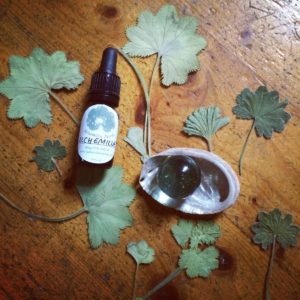
[:en]The Alchemist distills the Gold of a Thousand Mornings.
![]()
Lady´s Mantle has a time honored traditional use as a woman's healing herb. Lady´s Mantle has astringent and styptic properties, on account of the tannins it contains. It is a very healing herb for the womb and can be helpful for painful menstruations. It is a fertility herb, also good to use during and after pregnancy.
As a heart-tonic Alchemilla can be combined with prescribed medications. Strengthens the arteries. Good for swollen feet and legs.
![]()
The botanical name, Alchemilla, or “little alchemist” speaks of the uses of Lady’s Mantle which have the ability to transform. Matthew Woods writes an account of this in The Book of Herbal Wisdom.
The alchemists found interest in the fact that the morning dew gathers like a translucent pearl in the center of the fan-like leaves, well into almost mid-day, when other plants are all dried off.
“Something within it is distilling the essence and simultaneously helping to preserve it. In a material sense Alchemila must correspond to processes which encourage cohesion on the surface of the droplet and prevent vaporization, while at the same time (and plants seem to work in two opposite directions) it must possess the ability to refine and distill fluids into their most subtle expression or essence.”
![]()
In the same way in which the subtle, invisible membrane preserving the cohesion and integrity if the droplet is maintained, we can imagine Alchemilla making a subtle, invisible membrane around a person. It is encouraging integrity and cohesion. It works uplifting and empowering. It is about a kind of inner circulation and distillation.
It is healing to the emotional waters of the body and supports healing from sexual trauma.
[:sv]Alkemisten destillerar tusen morgnars guld.
![]()
Daggkåpa är en kvinnoört med sammandragande egenskaper. Den är läkande för livmodern och bra att ta till vid smärtsam menstruation. Den har använts traditionellt som en fertilitetsört och är stärkande under och efter en graviditet. Den stärker även hjärtat och artärer och går att kombinera med receptbelagda mediciner. Daggkåpa är bra vid svullna fötter och ben.
![]()
Etymologiskt avslöjar Alchemilla “den lilla alkemisten” att hon har transformativa förmågor. Matthew Wood skriver i sin bok “The Book of Herbal Wisdom” att alkemisterna fascinerades av att daggdroppar samlas i mitten av de solfjäderlika bladen och bevaras där långt efter att daggen torkat på andra växter på eftermiddagen. Någonting hos daggkåpan både destillerar och bevarar daggens essens. Alchemilla uppmuntrar en kohesion, en sammanbindning mellan molekyler och atomer i ett material, i detta fall daggen, och fördröjer evaporeringen, samtidigt som hon verkar ha förmågan att förfina och destillera vätskor till sitt mest subtila uttryck och essens. Växter arbetar ofta på detta sätt – i två polariteter av ett spektrum.
![]()
På samma vis som det subtila osynliga membranet bevarar kohesionen och integriteten av daggdroppen, kan man se Alchemilla skapa en subtil, osynlig bubbla runt en person på ett energiplan. Integriteten stärks och man känner sig sammanhållen. Daggkåpan verkar upplyftande och skänker inre styrka. Det handlar om en slags inre destillering och cirkulation. Den helar vårt inre vatten och de känslor som strömmar inom oss. Daggkåpa kan vara bra att ta till om man har råkat ut för emotionella eller sexuella övergrepp.[:]
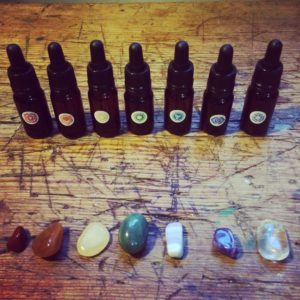
[:en]This is a series of spagyric formulas dedicated to the 7 chakras.
The seven chakras are the centers through which energy flows in our bodies. The chakras can be described as spinning wheels of light. In sanskrit chakra means circle, symbolising the endless rotation of shakti.
The spagyric formulas created for each chakra can be used in many different ways.
Create your own practice and rituals.
Perhaps chant the mantra or seed-sound corresponding to each chakra, visualize the color or yantra, do yoga connected to each chakra or just connect with the chakra within.
There may be a few chakras needing extra attention and strengthening and one decides to work with those for a while.
There is much information on the word wide web if you need to research. A good book is “Wheels of Life” by Anodea Judith. I write a few keywords to each chakra-elixir, starting from the root and ending at the crown.
All chakras at a special price 700 kr + shipping.
Otherwise 150 kr each, please specify which ones you want to order.[:sv]Detta är en serie spagyriska elixir dedikerade till de 7 chakrana.
De 7 chakrana är de centrum genom vilka energi flödar genom våra kroppar. Chakrana kan beskrivas som snurrande hjul av ljus. På sanskrit betyder chakra cirkel och symboliserar den oändliga rotationen av Shakti.
De spagyriska elixiren har skapats för varje chakra och kan användas på många olika vis. Skapa din egen praktik och ritualer.
Man kan till exempel intonera mantrat eller vokalen som hör till varje chakra, visualisera färgen eller yantrat, göra yoga, meditera eller på andra vis aktivera sina chakran i samband med att man tar elixir.
Kanske väljer man att fokusera på ett eller några chakran man vill stödja extra mycket under en period.
Det finns information att finna på nätet om chakrasystemet.
Anodea Judith har skrivit bra böcker i ämnet. “Livets hjul” till exempel.
Jag skriver några nyckelord vid varje beskrivning av chakraelixiren, från roten till kronan.
Specialerbjudande
700 kr + frakt för alla chakraelixiren. Annars 150 kr + frakt styckvis. Var vänlig skriv vilket eller vilka chakraelixir du vill beställa. Du kan även beställa via mail.[:]
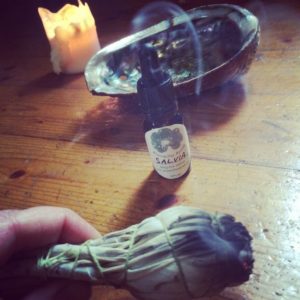
[:en]Sage is for the practicing mystic – I walk my talk
![]()
Sage is used for irritations and inflammations of the throat and respiratory system. Sage has an action on the liver, gallbladder and the digestive system and helps the liver to break down fat. Regulates sweating.
![]()
Purification of the self and purity in communication. Support in delivering our messages. Sage reconnects us to who we are and helps us to recognise wisdom in everything. How each reflection of life is a reflection of our own nature, as we hold the whole universe within our own being.
![]()
Sage helps with integration of the spiritual and the physical worlds together, dissolving the boundary between the mundane and the sacred, helping to bring knowledge into the heart where it can transform into wisdom. Sage is a wise plant teacher of many secrets.
[:sv]Salvia är för den praktiserande mystikern – I walk my talk
![]()
Salvia används vid inflammation och irritation i halsen och luftvägarna. Salvia verkar på levern, gallan och matsmältningen genom att hjälpa levern att bryta ner fett. Salvia hjälper till att reglera svettning.
![]()
Salvia främjar klarhet i kommunikationen. Den stödjer oss att leverera vårat budskap. Salvia hjälper oss att knyta an med vårt sanna jag och att upptäcka visdomen som finns i allt runt om kring oss och uppenbarar att alla reflektioner av livet är reflektioner av oss själva, ty vårat väsen innehåller hela universum.
![]()
Salvia stödjer oss att integrera den andliga och den fysiska verkligheten så den blir till en värld. Den upplöser gränsen mellan det vardagliga och det heliga och stödjer oss att förankra kunskapen i hjärtat där den kan transformeras till visdom. Salvia kan bli en inre lärare.[:]
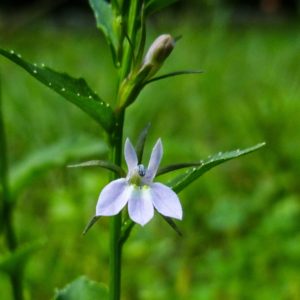
[:en]
It is hard to understand addiction unless you have experienced it yourself. – Ken Hensley
![]()
Lobelia is also called “Indian tobacco” and has a long history of use as an herbal remedy for respiratory conditions such as asthma, bronchitis, pneumonia, and cough. Historically, Native Americans smoked lobelia as a treatment for asthma. In the 19th century, American physicians prescribed lobelia to induce vomiting in order remove toxins from the body. Because of this, it earned the name “puke weed.” It is a purgatory, it means that it makes you vomit if taken in larger doses.
![]()
Lobelia impacts neurotransmitter activity in a way that is similar to nicotine. The active ingredient, Lobeline, is a both a nicotine agonist and antagonist derived from an Indian plant “lobelia inflata.” Here's what that means:
The brain has neurotransmitter receptor cells that have been labeled 'nicotinic' receptors because they are stimulated by nicotine. Lobeline acts on these cells as an 'agonist,' which means that it binds to these cells and stimulates them in a similar way to nicotine. (The effects are not as strong as nicotine, however.) Because the drug is in effect 'parked' at the receptor sites on these cells, it also partially blocks nicotine from activating them, thereby reducing the effect of nicotine in the brain from smoking, and helping to reduce the 'reward' associated with smoking.
Interestingly, unlike nicotine, which is highly addictive, lobeline does not appear to be addictive. This may be because of its structural differences from nicotine, and the different ways that it affects dopamine storage and release. (Dopamine is another a neurotransmitter – one that is implicated in addictive patterns of behavior.)
Rather than stimulating the release of dopamine in the normal way (from the presynaptic terminal), lobeline appears to induce the metabolism of dopamine intraneuronally as well as inhibit dopamine re-uptake. The result of this is that rather than getting a 'dose' of rewarding dopamine immediately connected to the behavior of smoking (or of taking lobeline), the dopamine effect is more diffuse. So you still get the pleasant dopamine effect, but because it is not strongly associated with the behavior, it does not induce addictive behaviors, and in fact partially blocks the addictive effect of nicotine intake.
Dwoskin LP, Crooks PA., (2002) A novel mechanism of action and potential use for lobeline as a treatment for psychostimulant abuse. Biochemical Pharmacology. Jan 15;63(2):89-98.
![]()
I made a formula to help people stop smoking or using snuff which is common in Sweden. So far this formula have helped around 12 people in quitting, myself included!
I recomend smokers or snuffers who wish to quit my formula rather than the pure Lobelia spagyric tincture because it has calming and adaptogenic herbs in it that helps the quitter cope with stress.
[:sv]
Det är svårt att förstå beroende om du aldrig har upplevt det själv. – Ken Hensley
![]()
Lobelia kallas även “Indiantobak” och har används länge i historien vid andningsbesvär, asthma, bronkit, lunginflammation och hosta. Den amerikanska ursprungsbefolkningen rökte lobelia för att lindra asthma. På 1800-talet började man ordinera lobelia som kräkmedel för att driva ut gifter ur kroppen. Det gjorde att man började kalla lobelia för “pukeweed”. I högre dos framkallar lobelia kräkning och det ska man veta om man är intresserad av att använda denna ört.
![]()
Lobelia impacts neurotransmitter activity in a way that is similar to nicotine. The active ingredient, Lobeline, is a both a nicotine agonist and antagonist derived from an Indian plant “lobelia inflata.” Here’s what that means:
The brain has neurotransmitter receptor cells that have been labeled ‘nicotinic’ receptors because they are stimulated by nicotine. Lobeline acts on these cells as an ‘agonist,’ which means that it binds to these cells and stimulates them in a similar way to nicotine. (The effects are not as strong as nicotine, however.) Because the drug is in effect ‘parked’ at the receptor sites on these cells, it also partially blocks nicotine from activating them, thereby reducing the effect of nicotine in the brain from smoking, and helping to reduce the ‘reward’ associated with smoking.
Interestingly, unlike nicotine, which is highly addictive, lobeline does not appear to be addictive. This may be because of its structural differences from nicotine, and the different ways that it affects dopamine storage and release. (Dopamine is another a neurotransmitter – one that is implicated in addictive patterns of behavior.)
Rather than stimulating the release of dopamine in the normal way (from the presynaptic terminal), lobeline appears to induce the metabolism of dopamine intraneuronally as well as inhibit dopamine re-uptake. The result of this is that rather than getting a ‘dose’ of rewarding dopamine immediately connected to the behavior of smoking (or of taking lobeline), the dopamine effect is more diffuse. So you still get the pleasant dopamine effect, but because it is not strongly associated with the behavior, it does not induce addictive behaviors, and in fact partially blocks the addictive effect of nicotine intake.
Dwoskin LP, Crooks PA., (2002) A novel mechanism of action and potential use for lobeline as a treatment for psychostimulant abuse. Biochemical Pharmacology. Jan 15;63(2):89-98.
![]()
Jag har gjort ett spagyriskt elixir (så kallar jag mina blandningar som innehåller flera spagyriska tinkturer) som stöttar de som vill sluta röka eller snusa. Hittills har denna blandning hjälpt ett dussin att sluta, mig själv inkluderad!
Jag rekomenderar rökare och snusare som vill sluta vara det detta elixir framför den rena spagyriska lobeliatinkturen för mitt sluta röka support elixir innehåller även lugnande och adaptogena örter som hjälper den som slutar att hantera stress.
jag vill dela med mig av 2 tips till den som vill sluta att röka att använda i kombination med elixiret:
[:]
